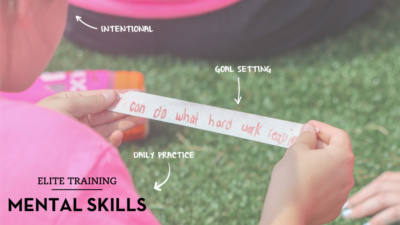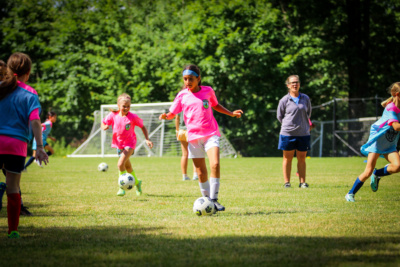At the Berkshire Soccer Academy, we understand that confidence and mental preparation are critical to performance on the field. Now that the fall season is over, we share some valuable insights from our Mental Skills Coordinator, Jenn Ireland.
Jenn has spent her fall working with female youth soccer players from across the country and at all competitive levels. Below she shares the most common themes that emerged from her work. We hope other players will learn from these lessons and will mentally reset and refocus during the winter break.
As an initial matter, it’s important to consider how mental hang-ups and self-defeating thoughts gain traction. The truth is that competitive sports participation inevitably gives rise to pressure, expectations and comparison (even when players are in a healthy environment). Most players aren’t equipped with tools to help them navigate these challenges. Team training typically consists of technical, tactical and physical components. Seldom, if ever, does it include a mental focus. Players are left to fend for themselves and often struggle to move through challenging moments and situations.
Here are 5 negative thought patterns that Jenn frequently encountered this fall along with guidance on how to shift away from these unhelpful thought patterns and towards a healthy, striving mentality.
PATTERN #1 – Players define success only in regard to their ability to meet results-based expectations (examples: winning, scoring goals, keeping clean sheets, eliminating errors).
NEW PERSPECTIVE: I don’t have to go along with the standard way of defining success. I can choose to define success differently. That means focusing on what I can control. I understand that in a game, all that I can do is ALL THAT I CAN DO, and success comes from doing THAT. Success to me means that, in every game, I focus on the controllable things I can do to move myself toward being the player I want to be. Win or lose, I can achieve that. Yes, winning and scoring are great, and I always want to strive for those things, but I can’t fully control whether they happen, so they can’t be how I measure success. If I let those things be my guiding light, and I define myself based on those expectations, I’m setting myself up to perpetually feel inadequate because I can’t fully control whether they happen.
MENTAL SKILLS TOOL: Identify controllable objectives, manageable, SPECIFIC, small actions that you have the power to do, no matter what everyone else is doing. These are conscious choices that you can always make. They are focused on the PROCESS of self-improvement, not on the outcome of the game and not on eliminating mistakes.
Examples of controllable objectives: challenging for every 50/50 ball, keeping your head on a swivel and making runs off the ball. These are all things that you have full control over and whether or not they happen is completely up to you.
PATTERN #2 – Players hold themselves back and do not try things (such as taking players on 1v1 or shooting more) because they fear the consequences of failure.
NEW PERSPECTIVE: Playing with the sole purpose of not making mistakes actually prevents me from playing with freedom, creativity and joy. It prevents me from maximizing my potential, accessing all my skills, and making an impact on the game. It keeps me small. There is no world where I get good at something by doing it perfectly every time. I understand that in order to get good at something I’m going to have to do it and mess up, a lot. This takes bravery, and I’m willing to be brave because I want what’s on the other side, I want to get good at this skill. When I try something and make a mistake, I’m not failing, I’m actually progressing. I’m going forward, not backward. In fact, every time I try, THAT is the win, regardless of how it goes – because each time I try, I move closer to mastery.
MENTAL SKILLS TOOL: The best way to move past a mistake and to shut down the overthinking and hesitation that can accompany it is to override it with a more helpful message. Instructional self-talk is when you give yourself a set of ‘instructions’ about what you should be doing right now in the game. It is the MOST HELPFUL thing you can do ON THE FIELD to keep yourself focused on the present. It triggers you to act and helps you avoid overthinking and eliminates hesitation. Instructional self-talk is short: 1-4 words only, a question or a command.
Examples of instructional self-talk: Check your shoulder! Find the gaps! Can I go forward? Where’s the space? The trick here is that you can’t just say it once, it needs to be put on repeat. If you only say it once, you’ll get sucked right back into the overthinking.
PATTERN #3 – Many players rely on external validation to give them confidence, meaning, they can only feel confident and successful when they receive approval and praise.
NEW PERSPECTIVE: Compliments are wonderful. It’s always great to hear a coach say, “nice job!” and have my hard work acknowledged. These words boost my confidence and help me feel good about myself. But when I rely on praise to generate all of my confidence, I am now allowing something outside of my control (other people) to determine how I feel about myself. I cede control of my confidence to others, and that’s a problem. Stable confidence and deep belief in myself doesn’t come from others; it comes from ME. No one can give me my confidence, nor can anyone take it away. I am in charge of that! I must be my own biggest cheerleader and believe in myself. I do this by making sure that I show up for myself every day, take charge of my development, and focus on what I can control.
MENTAL SKILLS TOOL: YOU are your inner coach. Talk to yourself, help yourself and COACH yourself through challenging moments. Encourage and advise yourself. Have your own back, Choose to celebrate your wins and your successes before looking to your coach or your parents to validate the good thing you just did. You WILL encounter adversity on your soccer journey. Coaching yourself will help you navigate that adversity.
PATTERN #4 – Many players get hung up on missed opportunities, referee calls, mistakes, and opponents who frustrate them. These distract them and cause them to lose focus on the game.
NEW PERSPECTIVE: Many of the things that come into my head during a soccer game, whether negative or just simply unhelpful, are essentially just distractions that impede my focus and concentration and mess with my performance. I must have the self-awareness to know that I’m overthinking or hung up on something WHEN I’M DOING IT. Then I suddenly have the power to ignore the distraction and choose to focus on something else. I have the power to think more helpful thoughts and to bring my attention back to the game. If I don’t notice the distracting thoughts, I can’t change anything. Therefore, it’s a WIN when I catch myself thinking such a thought because that’s the first step to deflecting it. When I’m self-aware of my thoughts, I can self-regulate my attention and my emotions and keep myself in my optimal performance zone, under pressure, in any circumstance. This is mental toughness. No matter what the distraction I can stay locked into the game- all by working to become more self-aware and NOTICING what’s going on in my head.
MENTAL SKILLS TOOL: Meditation is EXACT practice for staying focused on the field. It also helps you move AWAY from self-defeating thoughts, such as overthinking or getting hung up on mistakes. When you meditate, your mind is 100% guaranteed to start thinking about the past or the future. Your job while meditating is NOT to ‘clear your mind.’ This is a common misconception. Rather, your job is to NOTICE when your mind wanders, and then bring your thoughts BACK to the present by focusing on anything present-based, your breath, sounds, or how your body feels.
PATTERN #5 – Many players become hyper-focused on what they lack and get caught in a cycle of self-doubt and comparison, leading to feelings of inadequacy and failure.
NEW PERSPECTIVE: I choose self-belief, not self-doubt. Self-belief is the harder option and requires more work. Self-doubt is easy because, no matter what I am doing, there will always be a ‘next step’ that I need to work on. I understand though that this is part of the game and I choose to look at that ‘next step’ in a growth-minded way, NOT as what I can’t do compared to others. When I look at the ‘next steps’ as what I lack and have not yet achieved, I am constantly filled with doubt, I see myself as ‘not enough.’ I opt out of that thinking. Instead, in my pursuit of that ‘next step’, I pause often to look BACK at all of the things I’ve accomplished to get myself here. I allow myself to feel good about those accomplishments and use THAT to cultivate self-belief when I look forward and up towards the ‘next steps’ that I’m now working toward.
MENTAL SKILLS TOOL: Healthy competition helps to shift us away from comparing ourselves to others in a detrimental way and instead cultivates authentic motivation and drive. For example, let’s say you compete with a teammate for playing time. If you truly want to become the best player you can be, this isn’t a bad thing. It is a good thing. Having a strong teammate to compete with is one of the best things that can happen to you BECAUSE IT CALLS YOU TO STEP UP. It calls you to put in time, energy, and effort and to grow your skills. It calls you to take responsibility for your development and focus on what you can control to improve. It takes your focus off of the problem and puts it on the solution.
Focused mental skills work helps players navigate these challenges. The first step of mental skills work is normalizing the conversation around these topics. If a player struggles with any of the above, the winter months are a great time to start talking about how to lean into these new perspectives, so that players can enter the spring season with a fresh mindset. The reframes above are all part of the healthy striving mentality that helps players not just perform better, but find joy in the game and experience mental well-being and increased confidence. These new mentalities can take time to build, but with focused effort and patience for the process, players can change not just their game, but positively impact other aspects of their lives as well.
About the Author: Jenn Ireland, Mental Skills Coordinator at the Berkshire Soccer Academy, provides 1-on-1 mental skills coaching through the Mindset Mastery Academy. To learn more about this one-of-a-kind program, click on the link above or contact Jenn at jenn@expandyourgame.com. The next program begins in February.

Jenn Ireland
Mindset mastery academy
jenn@expandyourgame.com












